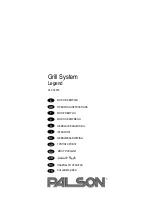
16
GENERAL
WARNING:
When servicing, use only
identical replacement parts. The use of any
other part may create a hazard or cause
product damage.
DO NOT use solvents when cleaning plastic
parts. Plastics are susceptible to damage from
various types of commercial solvents and may
be damaged by their use. Use a clean cloth to
remove dirt, dust, oil, grease etc.
WARNING:
Do not allow brake fluids,
gasoline, petroleum-based products,
penetrating oils, etc. to come into contact
with plastic parts. They contain chemicals
that can damage, weaken or destroy plastic.
DO NOT abuse power tools. Abusive practices
can damage the tool and the workpiece.
WARNING:
DO NOT attempt to modify
tools or create accessories. Any such
alteration or modification is misuse and
could result in a hazardous condition leading
to possible serious injury. It will also void
the warranty.
LUBRICATION
All of the bearings in this tool are lubricated with
a sufficient amount of high-grade lubricant for
the life of the unit under normal conditions.
Therefore, no further lubrication is required.
BATTERY PACK REMOVAL AND
PREPARATION FOR RECYCLING
To preserve our natural resources, please
recycle or dispose of batteries properly.
The batteries accompanying this tool may
contain chemicals and metals that are harmful
to the environment. Never dispose of
rechargeable batteries in your normal household
garbage or in landfill sites, because they will add
to the pollution of the environment.
Consult your local waste authority for
information regarding available recycling and
disposal options.
WARNING:
Upon removal of the battery
pack, cover the terminals of the battery pack
with electrical tape or heavy-duty adhesive
tape.
Never touch both terminals with metal
objects or body parts, because a short
circuit may result. Keep away from children.
Do not attempt to destroy or disassemble
battery pack or remove any of its
components. Rechargeable batteries must
be recycled or disposed of properly. Failure
to comply with these warnings could result
in fire and serious injury.
NICKEL-CADMIUM BATTERY
MAINTENANCE
Nickel-cadmium batteries are powerful, rugged
and provide hundreds of charge/discharge
cycles if properly maintained and periodically
‘exercised’.
Exercising is required to recover most of the
capacity lost during usage. This process reduces
the size of the active cadmium hydroxide
crystals on the anode, to expose the entire
surface area and restore capacity.
MAINTENANCE
!
!
!
!




































